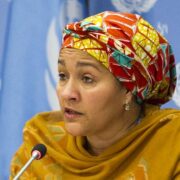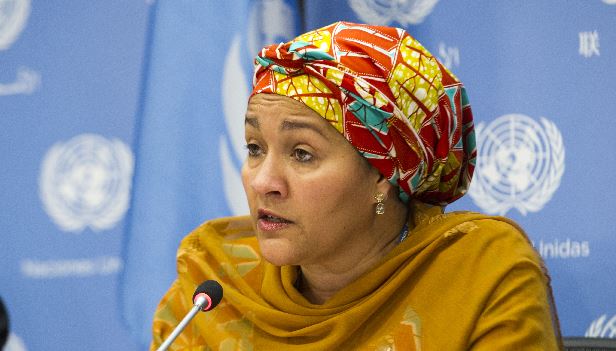“On the day after, women are the anchors of recovery, helping to rebuild trust and heal communities long after the guns fall silent.”
United Nations Deputy Secretary-General, Amina Mohammed, has called for the inclusion of women as equal partners in Africa’s security and peace processes, stressing that women bear the heaviest brunt of war but are too often sidelined in shaping peace and security strategies.
Speaking at the first-ever African Defence Chiefs Conference held in Abuja, Mohammed argued that sustainable peace in Africa cannot be achieved without women playing central roles in post-conflict recovery and nation-building.
The UN Deputy Chief made the remarks at the maiden African Defence Chiefs Conference, hosted by Nigeria, where she commended the participation of women experts on panels throughout the summit.
She reminded military leaders that ignoring women’s voices weakens the prospects of long-term peace, describing the gathering as “the birth of a new era in African security cooperation” and called for urgent, united action to confront shared challenges.
“Every one of you is born of a woman, unless you want to challenge that. The burden which women face whether they lose their husbands to the ultimate sacrifice in conflict, lose their children, or even their own lives means they deserve their rightful place in security decision-making and recognition here today.”
“On the day after, women are the anchors of recovery, helping to rebuild trust and heal communities long after the guns fall silent. We must see women not only as victims of war, but as partners in peace. Just as women are the bedrock of peace in our homes, they must be part of the search for peace on the war front,” she noted.
“This is not about winning wars. It is about winning peace, and doing it together. When we act in isolation, we hand our adversaries their greatest advantage, our division,” she said.
Mohammed broadened her message to wider continental security challenges, warning that Africa remains the epicenter of global terrorism deaths and must unite against extremist threats.
“Al Qaeda and the Islamic State affiliates coordinate across our continent, and the attacks in West Africa coastal countries have surged 250 percent in two years. By last year’s end, over 14,000 schools were closed in the central Sahel due to conflict. When young people see no path to education or justice, extremist propaganda finds an audience, and we risk losing an entire generation.”
She cautioned that cyberspace and artificial intelligence are fast becoming new battlegrounds.
“Cyberspace today is now a battle space. Elections are manipulated, institutions undermined, and lies spread until neighbour turns against neighbour. Artificial intelligence is already transforming the landscape of security. The same technology that offers solutions also carries profound risks. AI-enabled cyber attacks could cripple entire infrastructure and paralyze essential services.”
On climate change, Mohammed described its impact as a “clear and present danger to peace” across Africa.
“Shrinking water levels in the Lake Chad Basin have displaced over three million people. Extreme heat, sea level rise, and shifting rainfall patterns are driving displacement, exacerbating resource competition, and fueling instability. Climate change is a threat multiplier that fuels conflict, displaces populations, and undermines state stability.”
The UN Deputy Chief called for stronger regional and international cooperation, noting that Africa has shown its capacity for collective security action through ECOMOG, the Multinational Joint Task Force in the Lake Chad Basin, ECOWAS, and the African Union.
“When we act in isolation, we hand our adversaries their greatest advantage our division. Regional cooperation is the linchpin of African security and defence. Collaboration must be targeted and intentional.”
She highlighted three priority areas: pooled resources, intelligence and innovation, and people and partnerships including with the private sector.
“Pooling our budgets for joint responses makes us stronger than scattering the spending. We need the right tools and mapping in place to ensure data becomes decisions. And we must unite the public and private sectors, soldiers learning side by side with engineers, technicians, and innovators. This is how Africa’s own labs and companies empower our security future.”
Mohammed underscored that Africa is not merely a beneficiary of peacekeeping but a leading global contributor.
“Today, nine of the world’s top 15 contributors of UN peacekeeping are African nations. Without African leadership, there would be no effective peacekeeping. African crises demand African leadership, backed by global financial support, for African solutions to succeed.”
She concluded by linking security directly with development and the African Union’s Agenda 2063. She therefore called for courage and collective resolve, she urged African leaders to rise to the moment.
“Farmers cannot farm without security. Energy systems cannot be built without being protected. Every school, every hospital depends on security. Without security, development is impossible. Without development, security cannot hold.”
“Our voice must be heard beyond this room, carried into every international forum where decisions on defence are made. That is how we will shape Africa’s security on Africa’s terms,” she urged.


